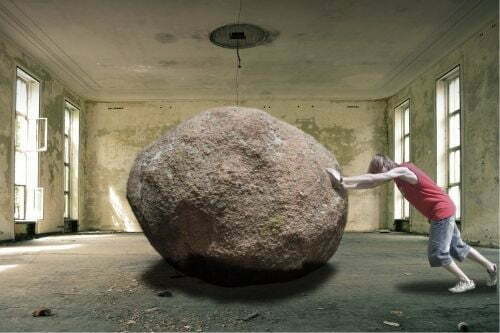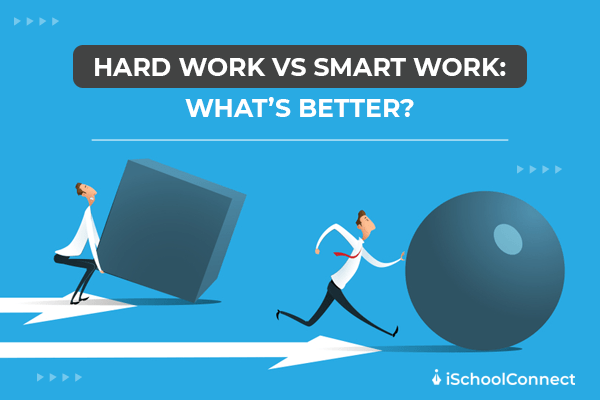Table of Contents
Hard work or smart work- which one should you choose?
In order to achieve our objectives, we are often told that putting forth the effort will benefit us. Finding a balance between hard work and smart work, on the other hand, is a contentious issue. We frequently come across the topic of ‘how to answer: the difference between hard work and smart work’ in interviews or group discussions. The ideal strategy for you may be influenced by your career goals and preferences. Read this blog to learn about hard work vs. smart work, as well as the key to merging both hard and smart work for being more productive.
What is hard work?
Hard work is defined differently by different people. The precise definition of hard work is to put in long hours on a regular basis, persistently, and with passion. This work can be physical, mental, or emotional in some circumstances.. Some people think of it as putting in extra effort, while others think of it as working tirelessly to attain their objectives. Below are some additional considerations to help you better comprehend the term “hard work.”
- Hard work entails dedication and commitment to the task at hand. It entails committing 100% of your time to your work, with no other obligations.
- Working hard also implies being honest and accepting full responsibility for your work.
- Strenuous physical effort is frequently associated with hard work.
What is smart work?

Finding viable methods to execute one or more tasks while managing time and quality is referred to as smart work. Because skills vary from person to person and take time to develop, smart work does not involve the traditional set of skills. Here are a few examples:
- Coming up with innovative and well-thought-out concepts
- Quickly adapting to new surroundings
- Strong communication and networking capabilities
- Having current knowledge of all facets of your job
- Being able to make difficult judgments when they are needed
- Knowing where to invest your resources.
Hard work vs smart work difference
To achieve personal success and also contribute to the success of the team, both hard and smart work is required. Here are some important distinctions:
Requirements
Working smart than working hard necessitates experience and a thorough grasp of how to do work so that you can come up with new ways to achieve your goal swiftly. Working hard necessitates a higher level of commitment to work to continue and complete it. Hard work necessitates commitment because you must devote more time to the job or task.
Process
Throughout a project, hard work is frequently aimed toward increasing production or quantity. Supervisors devise a dependable but repeatable strategy for achieving this goal, and staff work to reach the goal by following the template. The goal of the smart work process is to increase the quality of a product. This frequently entails putting new methods and ideas to the test to alter the manufacturing process. Smart work can provide desired outcomes, but at a lesser rate than hard work.
Concept
The idea of hard work stems from the practice of devising a technique and following it step by step to get the same goal. This strategy has shown to be beneficial for businesses and effective in ensuring client satisfaction. On the other hand, smart work is experimental and seeks results that go beyond profit. It is frequently wise to work in a way that promotes company growth and innovation.
Personality
Smart workers are frequently innovative and free-thinking. Others may regard these individuals as leaders. For individuals who prefer to be guided by a system, working hard is a superior option. Because of the method’s repeated nature, hard work can lead to an individual becoming a master at their talents.
Examples of hard work vs. smart work
“The Crow and the Pitcher,” is a perfect example of hard Work vs. smart Work. This does not negate the need for hard work; nevertheless, inventive work can change the game when hard work is no longer effective. Despite time constraints, people who work hard are goal-oriented. Unfortunately, because they are unaware of how dynamic the situation is, their intense concentration frequently leads them astray. This is the time when all of your efforts will be rewarded. If you use your intelligence and analytical thinking skills properly, you can achieve your goal in less time and with less resource and energy usage.
Quotes about hard work vs. smart work
Here are some of the most well-known quotes about hard work vs. smart work:
“Hard work pays off and pays the bills.“
“To work smart, you need to make your brain work hard.”
“Working smart doesn’t mean working less. It means working hard on what truly matters.”
‘‘Work hard and work smart, and you will earn extraordinary rewards.”
“The early bird gets the first worm, but the wisest bird gets the fastest one.”
“The most successful men work smart, not hard.”
“Those who work hard, work alone. Those who work smart, work as a team.”
“Dreaming is good, without working on it’s simply a myth!”
“I don’t believe in luck or in hard work without the so-called “work smart”. It’s not all about how you work hard but it’s about how you manage your time, resources, and mind to work together for a better output.”
End goal: Hard work vs. smart work

If you can combine both smart and hard work, you can achieve tremendous heights and live a better and more comfortable life. This will eventually help you gain well-deserved praise and attention. A systematic strategy combining smart work and hard work is necessary to achieve your goal. As a result, it is recommended that smart work and hard work be integrated whenever possible, as they both complement and fill in for each other when needed.
Key takeaways
- You must have a clear understanding of your goals before you begin working hard.
- Working smarter allows you to devote more time and attention to the things that matter most to you: your life objectives, personal development, health, and relationships.
- Working smarter than harder may just be a matter of maximizing the efficiency of your mental processes.
- Hard work is a method of completing a specific amount of work in a specific period using a direct approach.
If you liked this blog and want to read more like it, just visit here.
Liked this blog? Read next: Thought Changing Stories | 5 things you must preach!
FAQs
Q1. What exactly does “brilliant work” imply?
Answer – Finding more straightforward and efficient ways to finish your chores in the allotted time while maintaining quality is what brilliant work entails.
Q2. Which is better, effectiveness or efficiency?
Answer – The truth is that effectiveness takes precedence over efficiency. Task completion, activity completion, and goal attainment are all characteristics of effectiveness. Efficiency is defined as the most optimal or cost-effective way of doing a task.
Q3. Is intelligence the most important factor in achieving success?
Answer – Intelligence outperforms personality attributes like being kind, diligent, and generous in terms of success.






